Baijiu in Ancient China
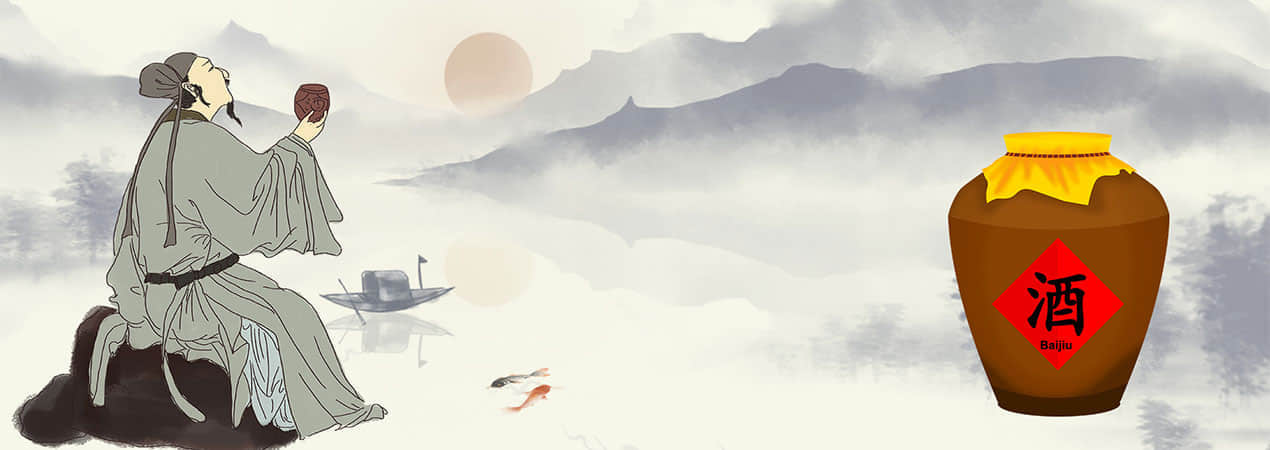
Traditions and customs have an important role in China, and a huge part of Chinese culture is the consumption of 'baijiu'. For thousands of years, baijiu has indeed shaped and been shaped by Chinese culture. It has influenced religions, arts, philosophy, and politics. It has helped unit together adversaries and brought about the downfall of kingdoms. People blamed the ultimate downfall of the Shang Dynasty (c. 2070–c. 1600 BCE) on excessive drinking.
Liquor plays a role in various ceremonies, both religious and secular. According to Liji or Record of Rites, drinking festivity is held annually in the local school of a village in Zhou Dynasty (1046-256BCE) where all the graduates take part. During the festivity, the chief of the village with the accomplished and virtuous men will choose the best graduates and recommend them to the king.
Baijiu with men of letters in ancient China
Chinese men of letters throughout the ages have long eulogized drinking as their sources of inspiration. Tang Dynasty (618-907CE) poem Du Fu wrote "Li Bai with one decaliter of wine can then produce one hundred poems" in his poem "Yin Zhong Ba Xian Ge (Drinking Song Among Eight Immortals)". Jin Dynasty (317-420CE) calligrapher Wang Xizhi wrote the famous "Preface to the Poems Composed at the Orchid Pavilion" after drinking with a group of friends. It was regarded as the greatest work of Chinese calligraphy written in the semi-cursive style.
Below we'll introduce the most famous men of letters who loved liquor in ancient China:
Li Bai (701-762 CE)
Also known as Li Po, was regarded as a pivotal figure in the Chinese poetry of the Tang Dynasty (618-907CE), and is often referred as the Golden Age of China. He is also one of the most famous liquor drinkers in China's long tradition of imbibers. Li Bai frequently celebrated the joy of drinking in his poems. During his lifetime, Bai wrote over 1,000 poems, many of which celebrate liquor. Below is one of his poems about liquor.
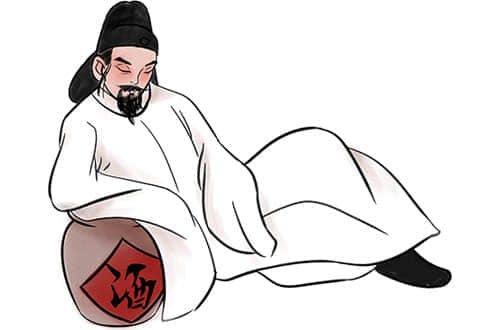
Li Bai: China's drunken superstar poet
If heaven loved not the liquor,
A liquor star would not be in heaven;
If earth loved not the liquor,
The liquor spring would not be on the earth.
Since heaven and earth love the liquor,
Need a tippling mortal to be ashamed?
The transparent wine, I hear,
Has the soothing virtue of a sage,
While the turgid is rich, they say,
As the fertile mind of the wise.
Both the sage and the wise were drinkers,
Why seek for peers among gods and goblins?
Three cups open the grand door to bliss;
Take a jugful, the universe is yours.
From Drinking Alone Beneath the Moon (2nd poem of the same title).
Tao Yuanming ( ca.365-427 CE)
Also named Tao Qian, was the first great poet of tianyuan ("fields and gardens"), landscape poetry inspired by pastoral scenes (as opposed to the then-fashionable shanshui ["mountains and rivers"] poetry). He is also one of the most famous liquor drinkers. He wrote 20 poems entitled Twenty Poems about Drinking. Those 20 poems have been read as an autobiography, and as being about his life as a recluse and drinking. The 14th poem read:
Old friends who appreciate my ways, carrying a jug, have got together and come.
Spreading brushwood mats, we sit beneath a pine,
A few pours later, once again we're drunk.
These geezers' talk is wild and lacking order; the sequence for filling up our cup is lost.
No longer aware there’s such a thing as "I" ...
how should I know what things should be esteemed?
Distantly, I lose track of where I'm going; in wine, there is a depth of flavor.
-Translated by Robert Ashmore
Su Shi(1037-1101 CE)
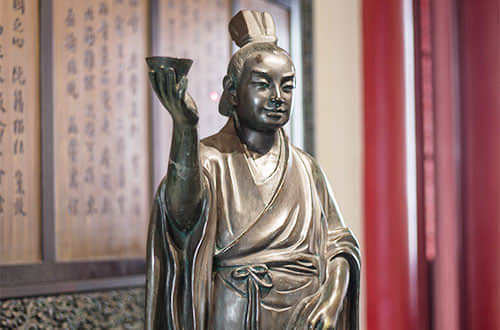
A statue of Su Shi in Tengwang Pavilion
Also known as Su Dongpo, is one of China's greatest poets and essayists, who was also an accomplished calligrapher and a public official. He is also an expert in brewing liquor. During his banishment days in the Guangdong area, he found that there was no government wine monopoly in this remote location, so he brewed his own. He experimented by using different ingredients. He grew to love cinnamon wine as it was slightly sweet in flavor but left no hangover. In Dingzhou he experimented making a variety of wines with tangerines, and one, in particular, was a pine wine. He created a tonic wine called "Zhen Yi wine" or "wine of ultimate inexpressible nature of all things", which was made from white flour, rice, and pure spring water. In the widely known poem "A Prelude to Water Melody", known as "ShuidiaoGetou" in Chinese, Su Shi wrote "When will the moon be bright? With a cup of wine in my hand, I ask the blue sky. In the heavens on this night, I wonder what year it would be?"
Wang Xizhi (303-361 CE)
He is the most celebrated of Chinese calligraphers. One of his most famous pieces of writing is Lantingxu ("Preface to the Poems Composed at the Orchid Pavilion") written in the semi-cursive style.
On the third day of the third Chinese calendar month in the year 353 during the Eastern Jin Dynasty, 41 literati gathered at the Orchid Pavilion (Lanting) on Mount Kuaiji (present-day Shaoxing in Zhejiang Province) for the Spring Purification Festival. They drank and composed poems to be compiled into a book. Wang wrote a preface on the spot. That is how famous calligraphy work came about.
Wang wrote "Lanting Xu" in one go when he was drunk. It is said that he rewrote "Lanting Xu" a few times after he sobered up, but none could compare to the original. He lamented: "This is divine work. It has nothing to do with my writing skill."
Drinking games of ancient China
According to Chinese scholars, there are approximately 726 kinds of drinking games in ancient China. Here we listed a few of the most popular.
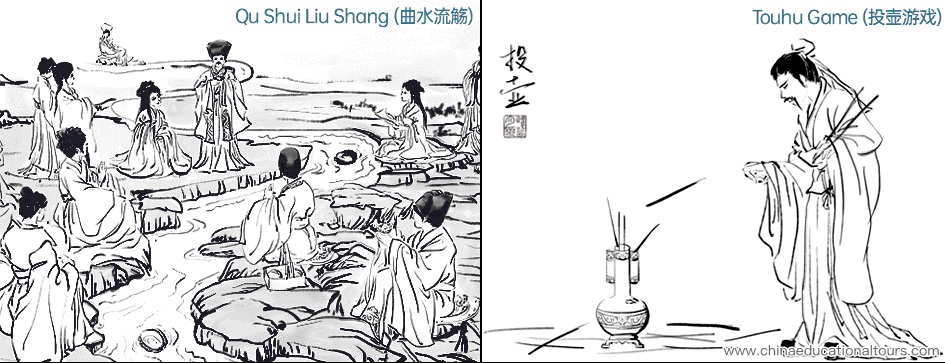
Chinese Drinking Games
Qu Shui Liu Shang (曲水流觞)
The game was played among scholars in ancient China. Sitting along the winding stream, the players put their cups full of wine and let them flow with the water. When a cup passes in front of someone, this person shall take it and drink. Later it gradually developed into a cultural custom that people not only drank but also had to write extempore verses.
Touhu Game (投壶游戏)
Touhu or arrow-throwing is a very popular drinking game in ancient China. Even ladies can play it. The game was developed from the archery rituals of Western Zhou Dynasty (c.11th century – 771 BCE). Each player has 4 arrows that he or she can throw into a narrow-necked vase. , Depended upon the numbers of arrows thrown into the vase, the loser was made to drink liquor.
Beat Drum and pass flower (击鼓传花)
One player will be blindfolded and his or her job is beating a drum while other players pass around a flower. If someone is holding it when the gong stops, that person will take a drink.
Ancient China drinking vessels
Chinese drinking vessels have a long history. They not only have a practical use in storing, pouring, and drinking the liquors, but also have a deep cultural and aesthetic value. From the drinking vessels one uses, it is also possible to determine the status of a person.
Chinese drinking vessels come in various shapes, which include cups, kettles, bowls, bottles, and jars. But we will focus on the bronze drinking vessels of Shang (c. 1600–c. 1046 BCE) and Zhou Dynasty (1046-256BCE) as you may encounter them when visiting museums in China.
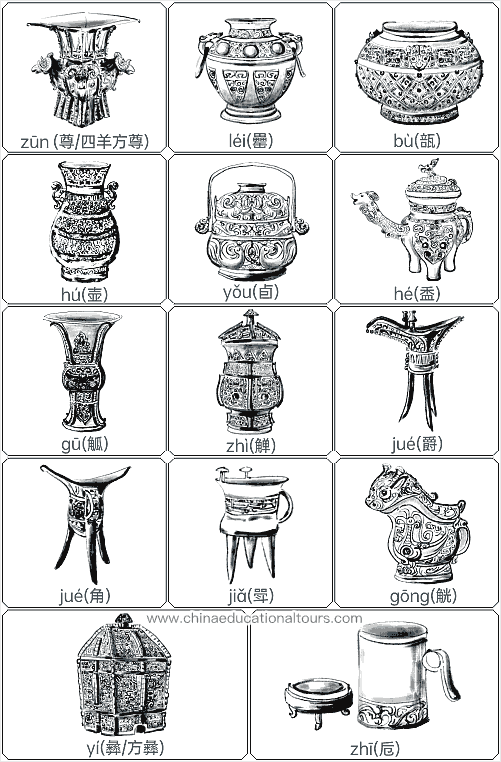
Ancient China drinking vessels
Zun (尊)
Characterized by an ample interior volume for containing wine and a wide opening for drinking. The most famous one is Square Zun with Four Sheep (四羊方尊).
Lei (罍)
Normally the lei was quadrangular (called fanglei方罍), tall and vase-like, but some may be round. It served as a wine storing vessel.
Bu (瓿)
It is a wide-bellied sacrificial vessel for millet wine from the late Shang times.
Hu (壶)
It is a ceremonial vessel used for holding wine that became popular during the Zhou dynasty. Their shape is typically slender near the top of the vessel, sagging towards the middle. They include a lid, two handles, and a base.
You (卣)
It's a tall, slim but some are wide wine jars with a carrying handle dated from early Shang to Western Zhou. There exist tall or small, round, flat, and bucket-shaped types. Later types have even shapes of animals, especially birds and monsters.
He (盉)
It's a three legged wine pot from early Shang. This simple piece with the three teat-like feet is based upon Neolithic shapes. With the long beak, some Chinese authors compare this vessel type with an animal, but one could think of more cultic parts of the body.
Gu (觚)
It's a tall, slim wine mug with a wide opening and rare ornaments from early Shang to Western Zhou.
Zhi (觯)
A rare type of covered wine vessel from the late Shang to Spring and Autumn period. There are flat and round types.
Jue (爵)
The jue's typical features are the long, canal-like beak and the shorter counterpart on the other side. On both sides, small handles are fitted.
Jiao (角)
A wine mug very similar to the jue, but with a cover. It is also compared to a kind of volume measure.
Jia (斝)
Three legged wine pot from the early Shang. The jia has the typical two big button-like attachments that in some cases have animal shapes. They are also attached to the jue mugs, but smaller.
Gong (觥)
An animal-shaped vessel type from the late Shang. It contains a multitude of animal forms covering the entire vessel. There are taotie masks on the front and back. If the rim line is curved the type is called shigong 兕觥, "Rhino horn gong".
Yi (彝)
A richly ornamented rectangular wine vessel from the late Shang to Western Zhou. the name yi or fangyi 方彝 is not original but was attributed to this vessel type by scholars of Qing Dynasty (1644-1917).
Zhi (卮)
The wide-bellied cup for drinking liquor, resembles a teacup we use nowadays.
Nicknames for Baijiu you may want to know
There are many nicknames for baijiu, we have listed a few below:
Du Kang (杜康), legend has that Du Kang is the inventor of wine, hence many people use Du Kang to refer wine. Cao Cao once wrote a famous line about liquor, "Nothing but Du Kang can assuage worries."
QiongjiangYuye (琼浆玉液), a liquor made from jade. In Chinese culture, jade symbolizes nobility, perfection, constancy, and immortality. So this name refers to very exquisite liquor.
Huanbo (欢伯), or happy god, many people drink as the solution to all life's problems and it will bring you happiness.
QingzhouCongshi (青州从事), means good liquor.
PingyuanDuyou (平原督邮), means low-quality liquor.
DiaoShi Gou (钓诗钩), or "fish hook for poems" means that liquor drinking will inspire you to write good poems.

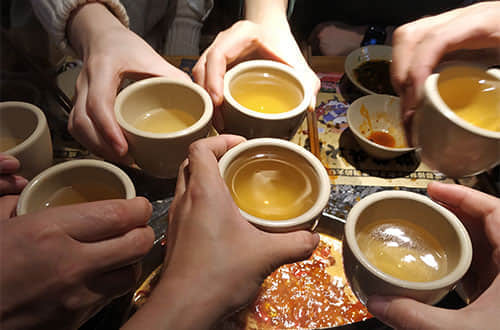 Ganbei (Bottoms up) - Chinese Drinking Culture
Ganbei (Bottoms up) - Chinese Drinking Culture  Chinese Beverages
Chinese Beverages  Drinking Water in China
Drinking Water in China 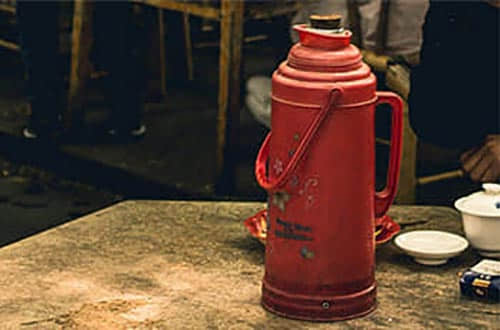 Hot Water in China
Hot Water in China